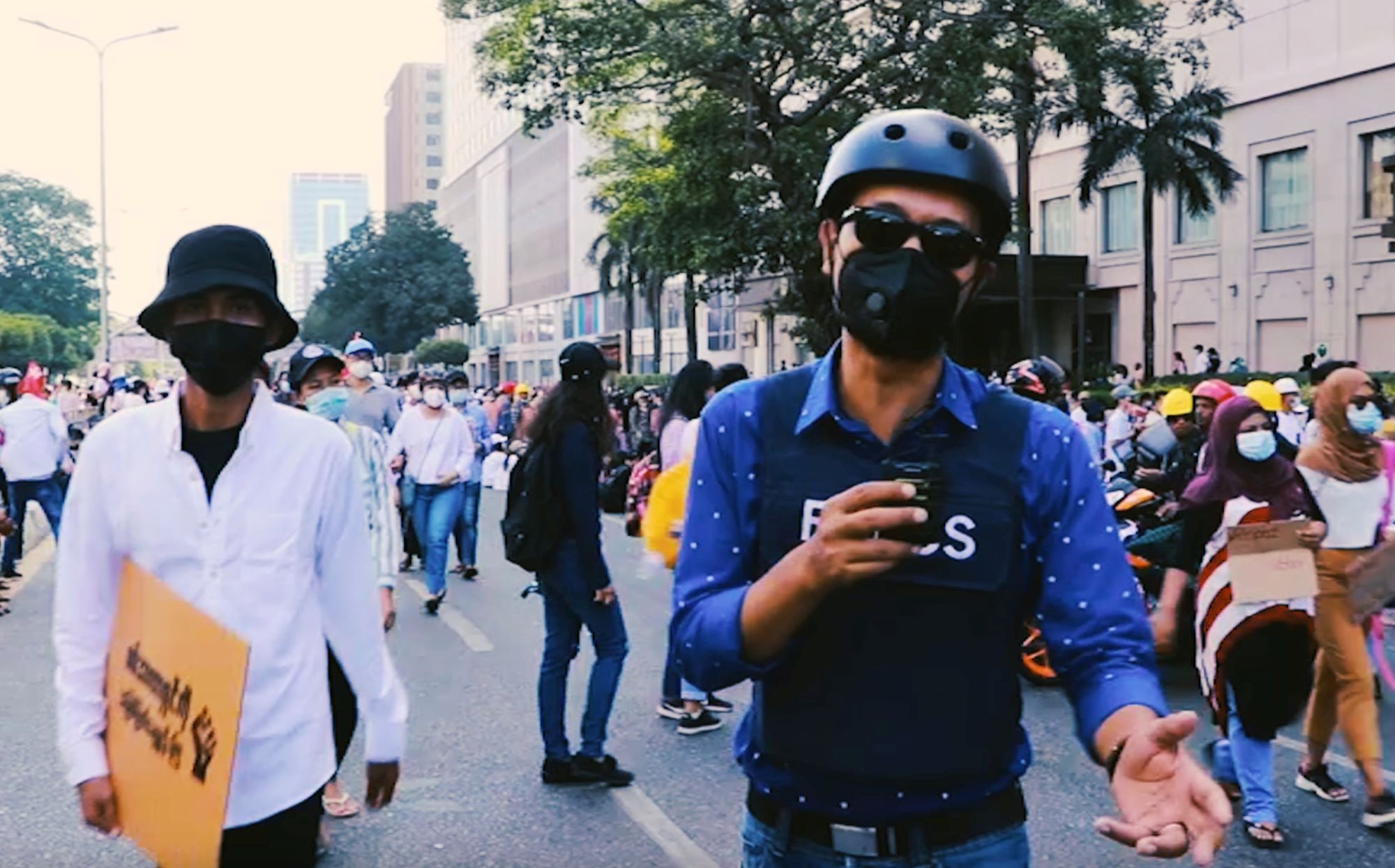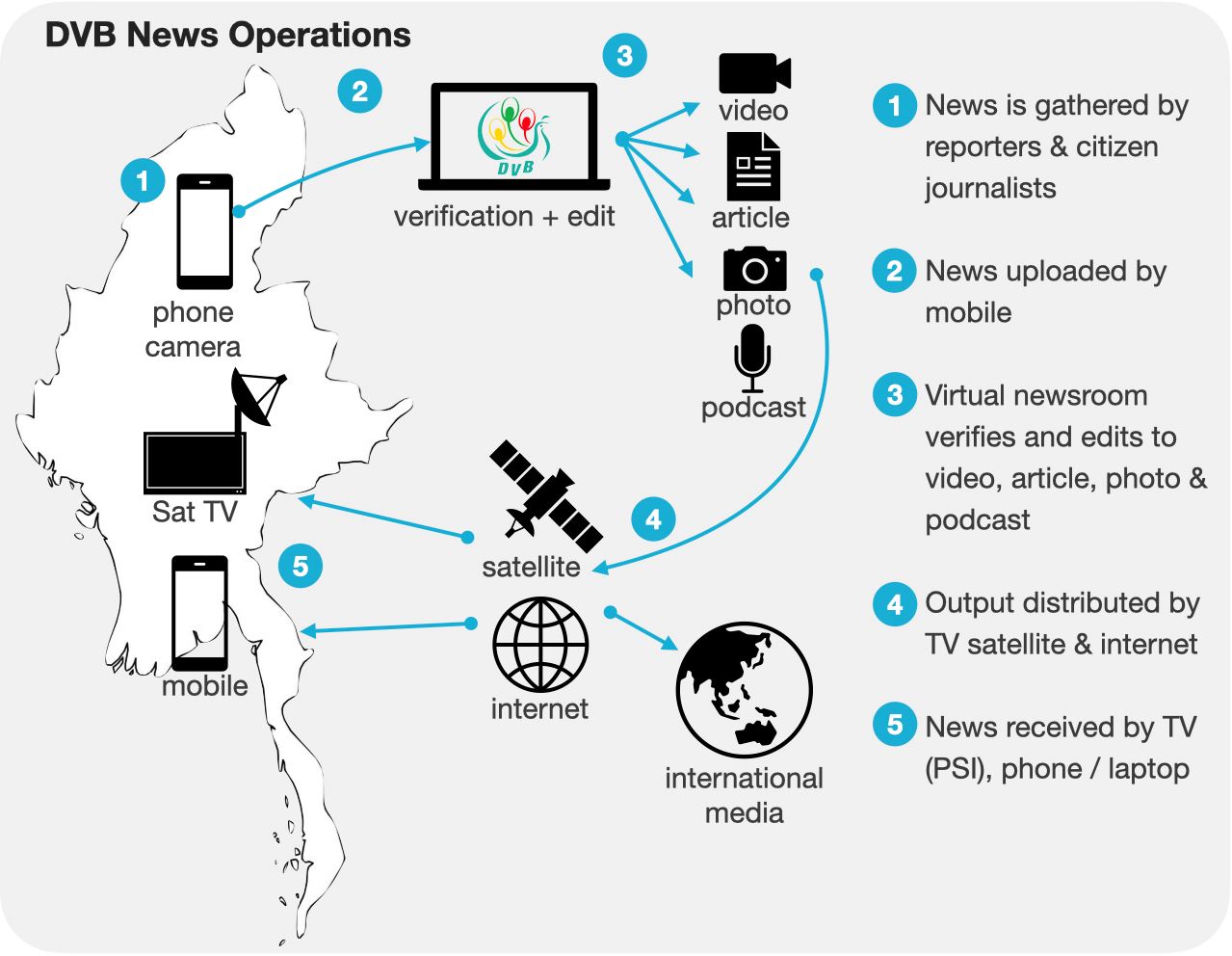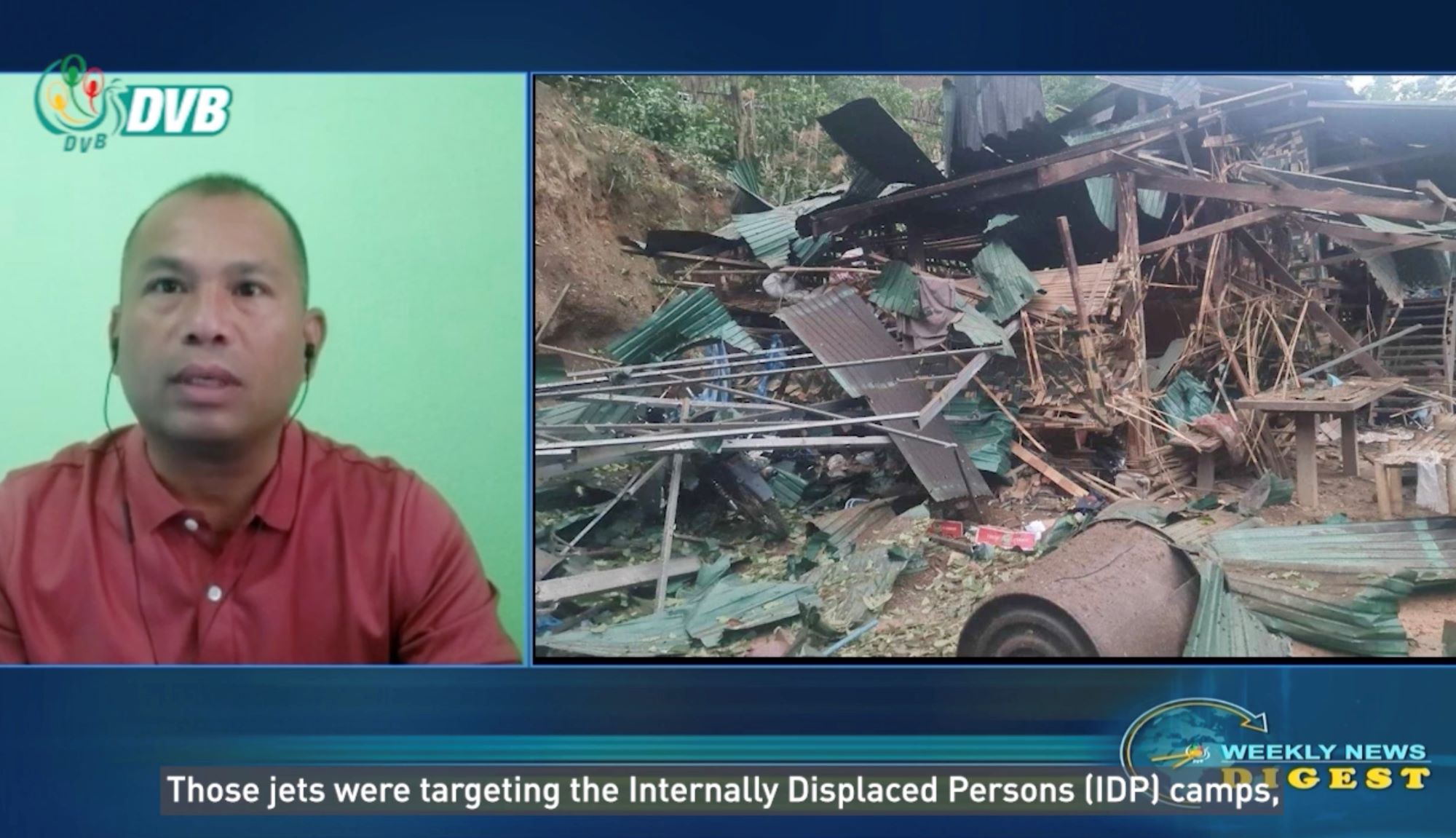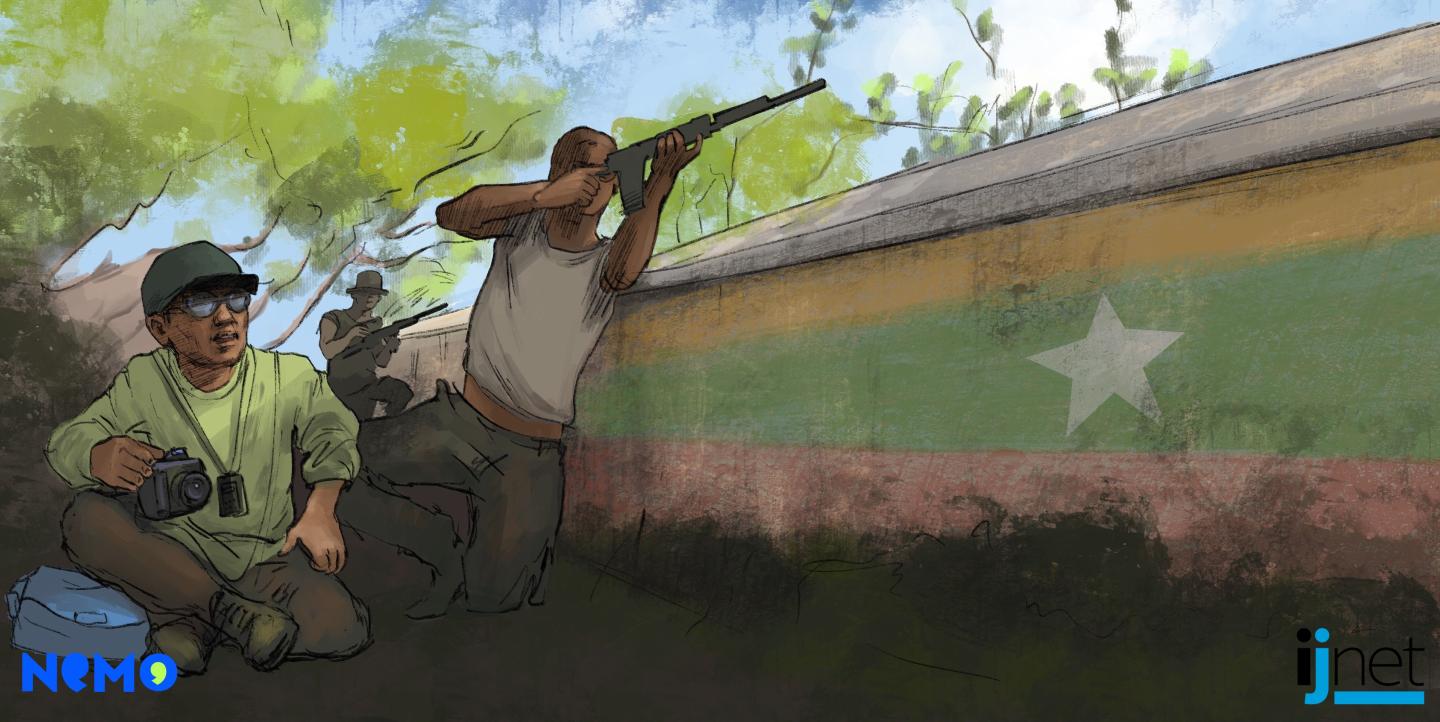This resource is part of our Exiled Media Toolkit, produced in partnership with the Network of Exiled Media Outlets (NEMO), and with the generous support of the Joyce Barnathan Emergency Fund for Journalists.
On the morning of February 1, 2021, Myanmar’s military, known as the Tatmadaw, staged a coup d’etat against the democratically elected government to reclaim power in the country. The junta has killed five journalists in the years since, and locked up more than 150, making Myanmar the world’s second biggest jailer of media workers behind only China.
“The junta turned back time,” said Ole Chavannes, a media developer with the Democratic Voice of Burma (DVB), one of Myanmar’s leading suppliers of independent reporting. “I’ve been with DVB since 2008. These kinds of threats and violence I haven't experienced before.”
On the day of the coup, the Tatmadaw kicked DVB off the state satellite system and revoked its operating license. The newsroom’s entire operation had suddenly become illegal, and its journalists found themselves in danger.
“Seven of our colleagues got arrested at the beginning of the coup,” recalled Chavannes. “They got tortured and experienced incredibly terrible things, especially because some also erased their mobile phones to protect their sources. They’re real heroes. One of them is still in prison as we speak, and the others we got out with silent diplomacy.”
DVB never stopped broadcasting into Myanmar, using a Thai satellite backup provider to do so. Its team fled the country and established operations across five primary locations: Oslo, Melbourne, Atlanta, Toronto and Chiang Mai, Thailand. Those who relocated abroad work with the largest underground network of citizen journalists inside Myanmar today, according to Chavannes.

“In Oslo, [our CEO Aye Chan Naing] was presenting the 8:00 news from his laundry room because it was the only quiet place in the house with a backdrop,” he said. “From all over the world we would present on the top of the hour the latest news. It's our professional honor to never go black.”
Here’s how DVB operates in exile today, reporting on one of the world’s most restrictive, dangerous settings for independent journalism.
Reporting in the shadows
Reporting in the shadows has been a part of DVB’s DNA since it was founded – and pioneering new technologies has been key to its success.
Before officially launching from Oslo in 1992, DVB operated as a shortwave jungle radio run by student rebels in the aftermath of the 8888 student uprising against the Tatmadaw junta in power at the time. “A bunch of them decided to stop fighting with bullets, but with information, with news,” explained Chavannes. “Student radio became, in Oslo, the Democratic Voice of Burma.”
In the early 2000s, DVB adopted satellite technology to broadcast its news. A decade later, to broadcast its coverage of Myanmar’s 2012 elections, the newsroom used an uplink station to beam content from inside the country to satellites, which it in turn sold to major international outlets.
When DVB operated inside the country from 2012 until 2021, they were the first to use drones to capture video footage, flying over the parliament building in the capital of Naypyidaw to show the country from above. Just last year DVB again turned to shortwave radio to supply daily news and information about disaster relief to those affected by Cyclone Mocha, which killed hundreds of people in May 2023.
The outlet’s bread and butter, though, is its citizen journalists’ mobile devices, which they use to film “everything,” said Chavannes. These journalists send along their footage and reporting to DVB, which then broadcasts via satellite to reach the Burmese diaspora and VPN users still inside the country – the vast majority of its audience. “We are actually a pretty big TV station,” said Chavannes. “Our operation to get original video from inside [Myanmar] every day, and from multiple angles to be able to double check if this is really real – that is never cheap. It requires an infrastructure.”

Events captured by mobile journalists on the ground serve an important role in pushing back on the narratives that the military junta has sought to impose – what Chavannes described as “North Korean proportions” of propaganda. “It’s a total parallel reality that the junta is shaping every day with their TV stations and the Global New Light of Myanmar newspaper,” he said.
DVB maintains a large, loyal following today, primarily on Facebook – with 20 million on the newsroom’s Burmese page, and almost 900,000 in English – and its YouTube, which has more than 2 million followers. This is despite it being illegal for people inside Myanmar to visit their site: DVB’s in-country audience risks going to jail simply for watching their videos or reading their content.
“People really tune in because it is sometimes even life-saving information,” said Chavannes. This holds especially true during Myanmar’s ongoing civil war between anti-military rebels and the junta. “It's depressing as hell, but it is war news that is really important for people to know.”
A decentralized structure
The day of the coup, DVB leadership offered its staff two months’ extra salary in hand if they wanted to leave. About 20% of the newsroom took the offer, said Chavannes.
The rest spread out around the world, and DVB set about establishing “satellite stations'' in Oslo, Melbourne, Atlanta, Toronto and Chiang Mai, all of which fall under the umbrella non-profit entity based in Thailand. The structure is complicated, but it enables the outlet to carry out local fundraising efforts while also providing a level of safety for its operations.
“It's almost impossible to stop us from broadcasting because we have all these plan Bs ready,” said Chavannes. He explained that the team worked with lawyers in each location to better understand local regulations. These vary by country, but they all have one thing in common: “it takes ages to get things done.”
Its benefits notwithstanding, the decentralized structure is expensive, so DVB is hoping to re-centralize by assembling as much of the team as possible in Chiang Mai, where it opened its new headquarters in June 2023.
The timeline is fluid, however, and complicated by immigration policies. “All my colleagues have to go to all kinds of immigration offices so many times, to get all kinds of stamps,” said Chavannes. “It's terrible.”

“Lean and mean”
The day of the coup, DVB lost half of its sources of revenue overnight. Before 2021, explained Chavannes, the outlet was funded 50% by grants and donations, and 50% by commercial revenue. The latter vanished instantly, as companies inside Myanmar no longer could legally advertise with the newsroom.
Against the diminished financial backdrop, DVB has tried to diversify its revenue while keeping operating costs “lean and mean."
For instance, DVB has worked to monetize its well-trafficked YouTube page using Google AdSense, and it is planning to introduce a membership program targeted at its international audience. For $8 per month or $80 per year, members will gain access to DVB’s content, livestreams and newsletters without advertising, among other perks. “That's why we started the membership program aiming more at an international audience that can also spend some bucks for the good cause,” said Chavannes, noting that this includes the Burmese diaspora.
The outlet can afford to pay its exiled journalists working from more expensive countries like Norway and the U.S. salaries at around the countries’ respective minimum wages. “These journalists are really passionate about their jobs, and they feel, also, a moral obligation to inform the people at home what is really going on,” said Chavannes.
“[They] hope one day it leads to a democratic Burma. That’s the only thing we’re not neutral about. We’re the Democratic Voice of Burma; we’re absolutely pro-democracy.”

Staying safe
Security, both for its journalists and its audience, has remained priority number one for DVB throughout the upheaval of the last several years.
Team members maintain a low profile on and offline, and they keep up with new technology to stay ahead of the government forces seeking to shutter the operation. “There's a very active digital army [military authorities] have. Our website is under constant attack, and they were, last year, kind of successful. It went down a couple of times,” explained Chavannes. “As of this year we have entirely new backup servers, so we're online all the time.”
Alerting its audience to security best practices is part of this effort, he continued: “It's an ongoing battle, and we educate our viewers also on how to stay safe, especially some simple tricks on your phone to erase your history, because phones are being checked a lot by military checkpoints and they go through the browser history.”
Coordinating with other journalists and newsrooms in exile has helped along the way. Chavannes urged colleagues in similar positions to do the same.
“It is so far away, so unimaginable for people – sorry to say – with more normal jobs, that it is really nice to talk with other people that are also working for exiled media. For them, it is not far away at all,” he said. “Reach out to other exiled media. I think we do that far too little.”
All images courtesy of DVB.
David Maas is the Senior Editorial Director, IJNet and Community, at ICFJ.

